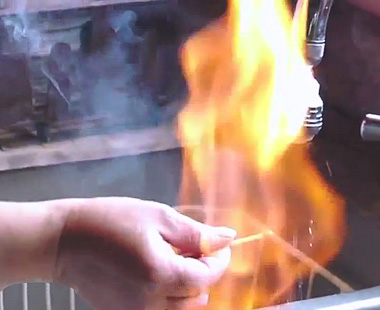Friends (allies? sweethearts? paramours? hot erotic lovers?) of the fossil fuel industry have done a hell of a good job shutting down official government observation of what it is they’re up to. Not as good as the industry would like, mind you, but a very, very good job in the eyes of those skeptical that their stewardship of the Earth is sincere. We’ve been sucking oil out of the ground for a century, so the two sides — the people extracting behind dark curtains and the people paid with tax money to politely ask if they might take a peek — have refined the points of friction to very specific points of debate.

Why on Earth would this need to be regulated?
Fracking, on the other hand, is fairly new. So fossil fuel companies are rushing forward, tossing cash into the boiler to build up speed, while their allies on Capitol Hill keep saying “woah woah woah not so fast” to regulators hopping from foot to foot, pointing after the frackers anxiously. From The Hill:
Congressional auditors conclude in new reports that the Environmental Protection Agency faces big hurdles overseeing a U.S. oil-and-gas drilling boom that’s creating “unknown” long-term health risks.
One of two Government Accountability Office reports made public Tuesday lays out “challenges” facing regulators amid the growth of hydraulic fracturing, or “fracking,” the development method that’s enabling major oil and natural-gas production increases. …
For instance, the report notes that it’s tough to inspect the large number of new well sites in Ohio, where the Utica shale play is attracting development, because EPA “generally does not receive information about new wells or their location.”
Yeah, sure. Why tell the EPA? Who made them the protectors of the environment, anyway? (Nixon.)
What’s increasingly happening is that the private sector is stepping in to fund research. Not the “private sector” meaning companies, of course — the private sector meaning nonprofits and foundations. From the Patriot-News:
Foundations from Philadelphia to Pittsburgh have provided more than $19 million for gas-drilling-related grants since 2009, according to an Associated Press review of charity data. The money has paid for scientific studies, films, radio programs, websites and even trout fishing groups that monitor water quality.
That’s led to expressions of gratitude from those who say state and federal governments aren’t doing enough on the issue but also protests from some in the gas-drilling industry, who claim there’s bias in the campaigns.
Of course they do.
The article highlights the Heinz Foundation, which has invested millions in research meant to determine the extent to which fracking affects water and air quality.
“[Heinz] Foundation support has been critical as we and others who study water have worked to understand how energy and water resources affect each other in southwestern Pennsylvania,” Carnegie Mellon University professor Jeanne VanBriesen wrote in an email.
R. John Dawes, executive director of the Foundation for Pennsylvania Watersheds, said Heinz funding “has been critical for citizen awareness and citizen input” on the gas-drilling issue.
But the Marcellus Shale Coalition, a leading industry group, criticized what it sees as a “record of bankrolling organizations and institutions opposed to the safe development of job-creating American natural gas.”
Sorry, Marcellus Shale Coalition. But I don’t think the Heinz Foundation is as influenced by your jobs rhetoric as a member of Congress might be.
Which is the overarching irony in this. Conservatives argue that the government should be reduced to nothing, its functions outsourced to the private sector. With fracking research, that’s (unfortunately) happening. So the critique is outsourced to the private sector as well.


